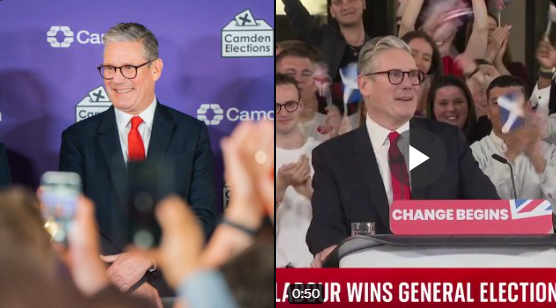The Conservatives of Great Britain betrayed their own people in the exact same ways the RINOS in the U.S. betrayed their own people. They each did nothing to help this nation, and did more for the Left than the Right. The people have had enough and the only choice they had with a national chance to succeed was Labour.
Britain’s Labour Party has achieved a commanding victory in the recent elections, securing a return to government after 14 years under Conservative leadership. Labour, led by Sir Keir Starmer, has captured 412 seats in the 650-seat Westminster parliament from just 34 percent of the popular vote, leaving two seats yet to be declared. The Conservative Party faced a significant defeat, plummeting from 371 seats to 121, marking their lowest tally in nearly two centuries and capturing only 24 percent of the vote.
Labour win the General Election by a landslide, ending the Conservative Party’s 14-year reign…
Keir Starmer is now the UK’s new Prime Minister, replacing Rishi Sunak 🇬🇧 pic.twitter.com/zUfdv2IBeM
— GRM Daily (@GRMDAILY) July 5, 2024
In his first speech as Prime Minister from 10 Downing Street, Starmer thanked his predecessor, Rishi Sunak, acknowledging his historic role as the first British Asian Prime Minister and commended his efforts during his tenure. Starmer emphasized the nation’s clear desire for change, rejuvenation, and a recommitment to public service in politics.
The election also saw gains for other political parties. The Liberal Democrats increased their seats to 71, and the Reform UK, led by Nigel Farage, secured four seats. In contrast, the Scottish National Party experienced significant losses, dropping to just nine seats. The election’s outcome reflects the limitations of the “first past the post” electoral system, which tends to disadvantage parties without concentrated regional support.
“To the country I would like to say first and foremost, I am sorry. I have heard your anger, disappointment, and I take responsibility for this loss,” says Rishi Sunak, former UK🇬🇧 Prime Minister, on the Conservative Party’s historic election defeat.#GE2024 #UKElection2024🇬🇧 pic.twitter.com/3H8DBSs6hi
— Kennedy Wandera (@KennedyWandera_) July 5, 2024
Sunak, accepting responsibility for the Conservative’s poor performance, announced his resignation and acknowledged the public’s frustration and disappointment under his leadership. This election cycle also resulted in significant losses for several high-profile Conservative figures, including former Defense Secretary Grant Shapps and ex-Prime Minister Liz Truss.
Sir Keir Starmer, who took over Labour leadership in April 2020 following the party’s defeat under Jeremy Corbyn, has shifted the party more towards the center politically. Under his leadership, Labour has focused on restoring stability and growth, prioritizing healthcare reform, and addressing immigration and border control issues prominently. The party has also committed to recognizing a Palestinian state in a proposed two-state solution process.
Nigel Farage, a well-known figure allied with former U.S. President Donald Trump, also achieved a notable personal victory by winning a seat in Parliament after several attempts, highlighting a successful electoral performance for Reform UK. Many in the U.S. are hoping for one day to see Farage as Prime Minister. Then we will all know that Great Britain is finally back on the correct course of freedom and growth.
In a historic political shift, the #UK general election saw the #LabourParty achieve a landslide victory, securing 410 seats and decisively ending the #Conservative Party’s 14-year tenure. The Conservatives won 131 seats, marking a significant loss for them and reflecting… pic.twitter.com/NdfKeD0iXR
— Horn View (@TheHornView) July 5, 2024
Major Points:
- The Labour Party, led by Sir Keir Starmer, won a decisive victory in the UK elections, claiming 412 of the 650 seats in Parliament, effectively ending 14 years of Conservative governance.
- The Conservative Party experienced a significant defeat, securing only 121 seats, a historic low that reflects a 20-point drop in voter support since the last election.
- Sir Keir Starmer, now Prime Minister, emphasized the nation’s desire for change and renewed commitment to public service in his initial address from 10 Downing Street.
- Other parties also saw changes: the Liberal Democrats increased their seats to 71, while the Scottish National Party suffered heavy losses, reducing their presence to just nine seats.
- Nigel Farage and his Reform UK party gained a foothold with four seats, marking Farage’s first successful election to Parliament after several attempts.
James Kravitz – Reprinted with permission of Whatfinger News



